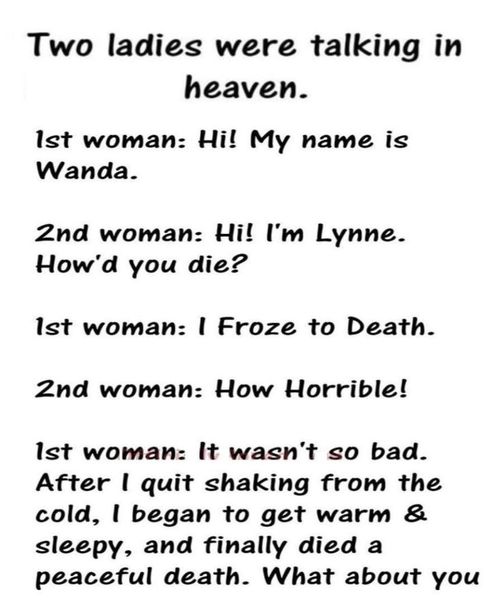Humor has a way of lightening even the most profound topics. Imagine two ladies meeting in heaven and swapping their “how did you get here” stories. This funny scenario unfolds with a clever punchline that’s bound to bring a smile to your face. It’s a humorous twist on the afterlife, showing that even up in heaven, a good laugh is the best way to break the ice. So, here’s how the story goes…
The Introduction: Meeting in Heaven

Two women, Wanda and Sylvia, meet at the pearly gates. Like anyone in a new environment, they strike up a conversation. Wanda, with a warm smile, introduces herself and soon finds herself chatting with Sylvia. The conversation naturally drifts to the big question: “So, how did you die?”
This light-hearted take on life and death immediately pulls you in. Imagine heaven, filled with people sharing their life stories and, in this case, their hilarious “death stories.” There’s no grief here, only the joy of sharing and, of course, a little bit of humor.
Wanda’s Story: Freezing to Death
Wanda begins by revealing her unusual demise. “I froze to death,” she says, matter-of-factly. Sylvia, horrified, responds with sympathy, “How horrible!” But Wanda surprises her by explaining, “It wasn’t so bad. After I quit shaking from the cold, I started feeling warm and sleepy, and I died peacefully.”
This twist on freezing to death reminds us of how adaptable we can be, even in the afterlife! Wanda’s recounting isn’t filled with fear or pain; instead, she describes a calm and almost serene experience, the opposite of what Sylvia expected. But now, it’s Sylvia’s turn.
Sylvia’s Story: A Heart Attack Fueled by Suspicion
When it’s Sylvia’s turn to share, she recounts her own unexpected demise. She explains that she suspected her husband of cheating, so she came home early to catch him in the act. “I was sure there was another woman there,” she says with conviction. But to her surprise, she found her husband alone, peacefully watching TV.
Determined to uncover the “other woman,” Sylvia shares how she frantically searched every inch of the house. She checked the attic, the basement, every closet, and even under the beds, convinced that someone was hiding. Her relentless search eventually led her to collapse from exhaustion, triggering a heart attack that ultimately led her to heaven.
The Punchline: A Lesson in Irony
After listening to Sylvia’s story, Wanda pauses, smiles, and delivers the punchline: “Too bad you didn’t look in the freezer—we’d both still be alive!”
This punchline brings the whole story together, adding a layer of irony that’s both clever and unexpected. The freezer, of all places, becomes the comedic focal point, bridging both women’s deaths in a way that’s surprisingly funny. It’s a playful jab at the lengths we go to when suspicion takes over and how sometimes, the answer is right under our noses—or, in this case, in the freezer.
The Power of Humor: Why Jokes About the Afterlife Resonate

There’s something universally appealing about afterlife jokes. They tackle serious themes—life, death, relationships—in a way that feels light and relatable. In this story, Wanda and Sylvia’s humor shows us how laughter can bridge even the most profound divides. By turning their unfortunate demises into a funny exchange, they make the topic of death approachable, transforming it into a shared experience of laughter.
This type of humor connects with us because it reminds us that life, no matter how dramatic or challenging, often has an element of the unexpected. The punchline, in its simplicity, speaks volumes about human nature and our tendency to overlook the obvious while pursuing what we’re convinced is true.
Bonus Story: Four Nuns Go to Heaven
If you enjoyed Wanda and Sylvia’s story, here’s another light-hearted tale about the afterlife that’s equally hilarious. Picture a group of four nuns who arrive at the gates of heaven. St. Peter greets them, but before they can enter, he has a question for each.
He asks the first nun if she’s ever touched a certain forbidden item. Blushing, she admits to touching it with the tip of her pinky. St. Peter instructs her to dip her finger in holy water, and she’s admitted to heaven.
Then, he turns to the second nun, who confesses to holding it briefly. St. Peter asks her to wash her hands in holy water, and she, too, is allowed to enter.
The Unexpected Twist: A Race for Holy Water

At this point, there’s a commotion in the line. The fourth nun, Sister Susan, is trying to push ahead of the third. St. Peter, puzzled, asks why she’s in such a hurry.
Sister Susan responds with a witty quip: “Well, if I’m going to have to gargle this stuff, I’d rather do it before Sister Mary sticks her ass in it!”
This twist highlights the mischievous nature of humor and how it can add levity to any situation. Even in this holy setting, the joke showcases the playful, human side of the nuns, reminding us that laughter knows no bounds—not even at the gates of heaven.
Why We Love These Afterlife Stories
Humorous afterlife stories resonate because they allow us to explore universal themes like life, death, and redemption without fear or sorrow. By imagining heaven as a place filled with lighthearted conversations and relatable human quirks, these jokes bring comfort. They remind us that perhaps, in the end, we’ll all be laughing together, regardless of our backgrounds, beliefs, or life stories.
These stories also touch on relatable themes—jealousy, suspicion, regret, and forgiveness. Wanda’s and Sylvia’s stories play on the idea of suspicion leading us to our own downfalls, while the nuns’ story reflects human nature’s lighter side, even in moments of solemnity. Each story carries an underlying message: laughter is timeless, and humor can be found even in life’s most unexpected moments.
A Reminder to Share the Laughter
Stories like these are worth sharing, not just for the laughs but for the perspective they offer. They show us that life—and even death—doesn’t have to be so serious. Humor has a unique way of making us feel connected, understood, and uplifted, even when we’re reflecting on heavy topics. So, share these stories with friends, family, or anyone who could use a good chuckle. Laughter truly is the best medicine, and these jokes are a reminder of just how healing it can be.
Conclusion: Finding Joy in Every Chapter
At the end of the day, stories about Wanda, Sylvia, and the four nuns remind us to take life—and even the idea of the afterlife—with a pinch of humor. These tales show that no matter where we find ourselves, there’s always room for laughter. Whether we’re swapping stories in heaven or sharing a joke on Earth, humor is a universal language that brings us closer and makes every experience a little brighter.
So, the next time you hear a good afterlife joke, pass it on. Because if Wanda, Sylvia, and those nuns taught us anything, it’s that a good laugh has the power to bridge worlds, lift spirits, and keep us smiling—even in the hereafter.


